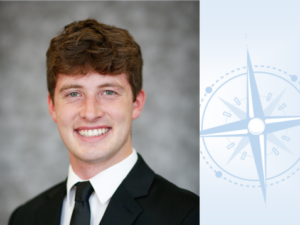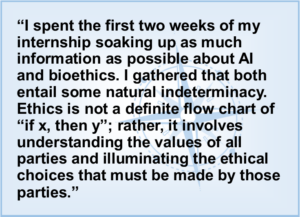Two Things I Learned as an Ethical AI Intern
By Elijah Wetzel, junior a Wabash College, Crawfordsville, IL.

Back in January, I sent emails to around 15 organizations inquiring into any summer openings for undergraduates that might be available. It was getting down to crunch time for summer internships, and like many students hoping to gain insights into what they may want their future career to involve, I had been searching the internet for groups that might have space for an intern.
I’m a religion major with minors in political science and global health at Wabash College, a small liberal arts school in Indiana, and I was interested in finding some opportunity to learn about a field that draws from religion, policy and law, and global health. Bioethics seemed to me a natural integration of those subject areas; as a student and proponent of the liberal arts, the multi-disciplinary nature of bioethics beyond even the aforementioned areas appealed to my curiosity too.
Overcoming My Achilles Heel
I didn’t have a lot of knowledge or experience with bioethics, but I still probably had more than most undergraduates. I had taken a class in the fall of 2024 called “Religion and Healing,” where much of what we talked about could be categorized as bioethics. I’d also become fascinated by the work of Dr. Richard Gunderman, a pediatric radiologist and Professor of Radiology, Pediatrics, Medical Education, Philosophy, Liberal Arts, Philanthropy, and Medical Humanities and Health Studies at Indiana University who has written and presented on a diverse array of topics in the bioethical sphere.
Still, while I had these experiences and had read some books about ethics, I couldn’t point to any “real-world” experience. So, when I found the Center’s website in January and – having been captivated by their work and excited by how well it aligned with my interests – sent an email asking for the chance to work at the Center in some capacity for the summer, I did not have high hopes that I would receive a reply, let alone a positive one.
for the summer, I did not have high hopes that I would receive a reply, let alone a positive one.
A lack of real experience in the field they desire to work in is the Achilles Heel of students applying for summer internships. With no degree or work experience relevant to bioethics, the best I could hope for would be one of the groups that I emailed to grant me the chance to learn and apply the skills I did have to the best of my ability. Thankfully, Vice President of Ethical AI Dr. Lindsey Jarrett gave me that shot.
Two Things
I joined the Center’s Ethical AI program team as an intern in May. The past couple of months have been exciting. I’ve vastly increased my knowledge and understanding of AI and contributed to the conversation of bioethics through my work and what I’ve written.
I spent the first two weeks of my internship soaking up as much information as possible about AI and bioethics. First, I gathered that both entail some natural indeterminacy. Ethics is not a definite flow chart of “if x, then y”; rather, it involves understanding the values of all parties and illuminating the ethical choices that must be made by those parties. So, in any ethical dilemma where a choice must be made, the outcome is up to the participants and is not based a deterministic formula of right and wrong.
AI struck me as similar. The unprecedented nature of AI obscures its future, and, combined with a relative lack—at least in the United States—of regulations and guidelines on AI, the current landscape of AI looks more like a Wild West than a structured, predictable ecosystem. Like the participants in an ethical dilemma, participants in AI—developers, policy makers, users, patients, and others—will create the future of AI as their values interplay.
Additionally, I learned that it is important to recognize what voices are being heard in ethics and AI conversations. It would be a mistake to believe that power structures fall to the wayside as participants negotiate the future, be it of a particular ethical dilemma or the AI field. Being able to answer the questions, “Who has a seat at the table” and “What are the values they are prioritizing” is of the utmost importance to ethical AI.
What They Need to Hear
Over the next several weeks of my internship, I contemplated these questions while working on prototypes of AI transparency statements addressed to healthcare executives, clinicians, and patients and a letter to AI developers urging them to prioritize tenets of medical ethics in their product development.
I felt the difficulty of trying to write intelligently about topics that I was still relatively new to, and I initially struggled to make a convincing argument in the letter to developers and write concise, topical transparency statements. The questions who has a seat at the table and what values are they prioritizing needed another wrinkle: What do those groups need to hear? In the context of a transparency statement, this meant empathizing more thoroughly with the concerns of the group—be it C-suite leaders, clinicians, or patients—to whom the statement was addressed. What really matters to them? What essential questions would keep them up at night?
I progressed beyond dumping all the information I could into a statement and instead strove to synthesize that information down to the crucial and pertinent bits. Likewise, my persuasive letter to AI developers needed to focus more on the specific concerns of developers. I wasn’t making an argument to ethicists or clinicians, fields in which the importance of ethics is often taken for granted; I needed to convince developers in the business world that emphasizing ethics in their development phase would benefit them and their companies. In both paradigms, the transparency statements and the letter to AI developers, I learned that it is not enough to ask who is talking and what they are saying. To lead well in the emerging field of ethical AI, one must also ask what other participants need to hear in order to arrive at an ethical consensus.
I’m grateful to the Center for Practical Bioethics and its staff, especially Dr. Jarrett and Odessa Sawyer, MSW, for giving me a chance to contribute to the ethical AI space and play a small role in their mission “to raise and respond to ethical issues in health and healthcare.”
Written By Elijah Wetzel, junior a Wabash College, Crawfordsville, IL.
Elijah will spend his first semester this year at the University of Edinburgh.


